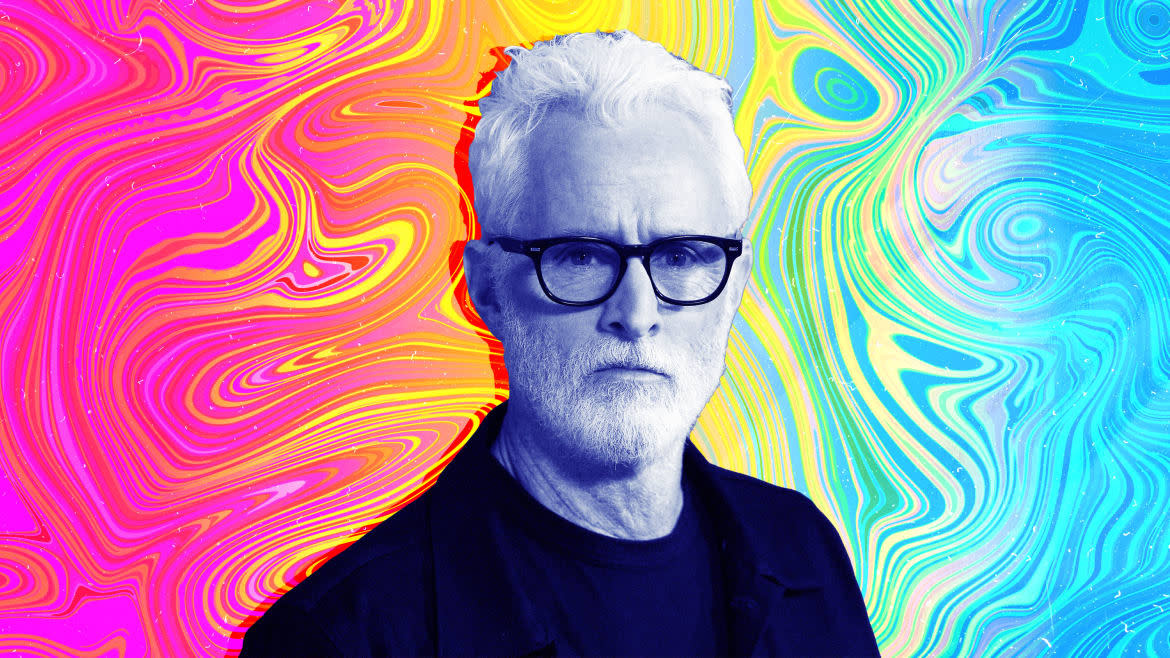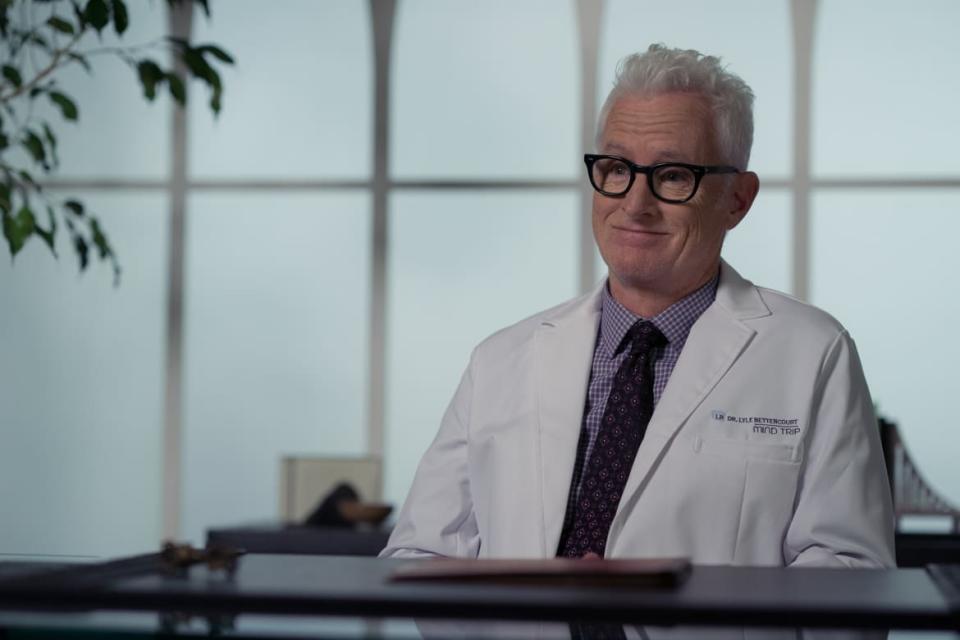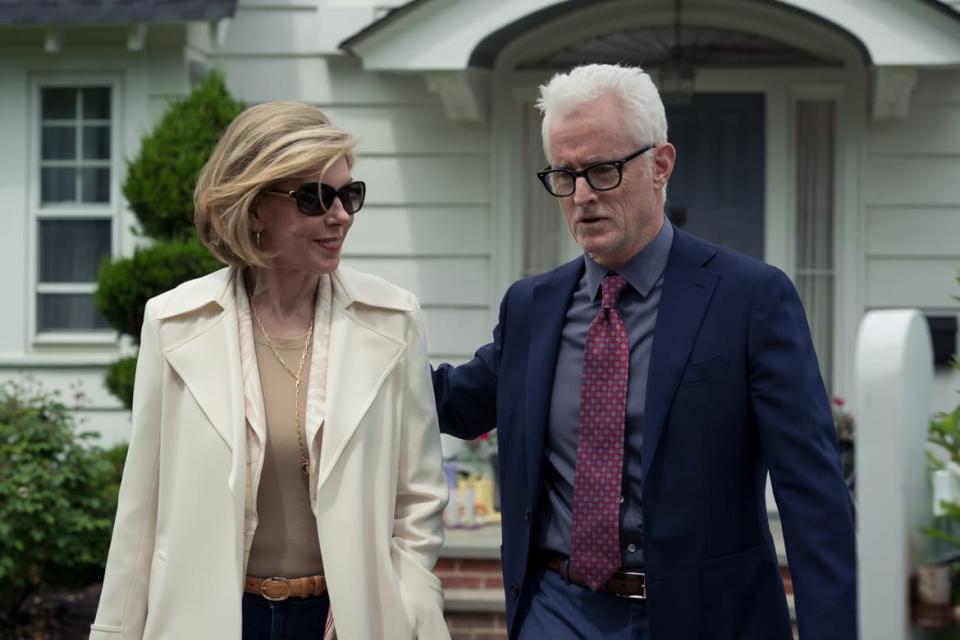John Slattery Takes ‘The Good Fight’ on One Last Acid Trip

There are countless things that people have turned to in order to help them cope with the darkness and stress of the world over the last several years, But none of these methods seem to be as effective as being microdosed by John Slattery.
The Paramount+ drama series The Good Fight has spent six seasons grappling with the surreality of the world post-Donald Trump’s election, from the Black Lives Matter movement to the rise in political extremism to the pandemic. Its characters, like all of us, attempted to find stable footing amidst the chaos, hope amidst the crushing trauma, and a modicum of justice and accountability amidst a culture gone reckless.
The first of the show’s final two episodes premieres Thursday. (Its title: “The End of Democracy.”) Over its run, the series has displayed a dexterous ability to bottle the unease and overwhelmed feelings many of us have been experiencing. Watching those storylines has been a tonic for Good Fight fans, who have found it soothing to see not just the ludicrousness of real-life events dramatized, but also a reflection of their own relationship to that madness.
This season, Slattery, the Emmy-nominated Mad Men veteran, joined the cast as Dr. Lyle Bettencourt, who takes on Christine Baranski’s regal lawyer Diane Lockhart as a patient. Diane’s visits are for what some might consider unusual treatments: Lyle sets her up with an IV drip of ketamine so that she can essentially “trip.” With her altered mental state, and through her therapy-like conversations with Lyle about the experience, Diane feels better equipped to move through a life that seems otherwise too unsettling to face.
While the intense connection she develops with Lyle is new—in one episode, she hallucinates a threesome with Lyle and her husband, played by Gary Cole—Diane’s reliance on reaching an altered state to get through the day isn’t. The character has been experimenting with microdosing since the show’s second season.
“The show, I think, came into its own when Diane started microdosing,” Robert King, who co-created the series with his wife, Michelle, told The Daily Beast’s Obsessed. “There seemed to be no original way to take on Trump, because, as everybody says, how do you satirize something that self-satirizes? We realized that it's not about the political world. It's about the inner space of liberals who were being driven crazy by the political world, because that's where the comedy rests.
“Things can't get crazier than what they are,” he added. “So what does someone who's dealing with that world do? You're in the backseat and the person driving the car is drunk and high out of his mind, and the car has no steering wheel. How do you live in that space? For four, then five, and now six years?”
As The Good Fight’s final season winds down, we caught up with Slattery to talk about that phenomenon and his character’s role in navigating it. Here’s what he had to say about helping guide The Good Fight through one last trip.
‘The Good Fight’ Let Christine Baranski Vent Her Anti-Trump Rage
It must have been an interesting experience figuring out a character who exists both in the real world and as a character in Diane’s hallucinations.
At first, I was like, “I really don't have to wear the white doctor’s coat and that whole bit, do I?” And they were like, “Well, we want him to seem as establishment and professional as possible, and err on the side of very conservative in that regard, so that the unorthodox methods that he uses and hallucinations that she has as a result, are that much more of a surprise. That’s also so that she trusts this person. It isn’t some sketchy operation, where you come in and somebody gives you a pill, you hallucinate, and you go home. They wanted to set up this practice as something that was very highly professional and medical.
What do you make of what Diane is doing, and what many people have been doing: tripping or microdosing in order to face reality? Do you empathize with that at all?
It makes sense to me. A lot of people, we self-medicate by having a cocktail at the end of the day. Look at the rise in the legality of marijuana. It’s [all] self-medication, it's just different substances. This is taking those hallucinogens and psilocybin, and that microdose is just enough to elevate or change the body chemistry to take you out of your depression or your anxiety in what has become an increasingly anxious and angst-causing world. It makes total sense to me.

I think people who watch the show were surprised and amused that a character who seems as put together and classy as Diane Lockhart would do something like microdose. But maybe it does reflect a more sophisticated way of navigating a wilder world, even for people of her stature.
I don’t think stature is relevant to it. I think everybody has the same kinds of feelings. Well, they’re all not the same, but everybody has a lot of feelings, and they’re all dealing with a lot of stimuli that are challenging and difficult and frightening. The world is so divided and so violent in so many places. To me, it makes total sense. It’s almost like the higher-achieving you are, the more stress you bring on. Somebody like Diane, who’s going at the problems of the world, brings all that stress into her life. So it makes double sense that she would seek out some kind of relief, especially when all the work she does politically and legally doesn’t seem to be changing the world in the way she thought it might.
Has being a part of this arc on the show made you think about the ways that you’ve coped with these last few years and the things you’ve done to process them? Maybe not microdosing, but…
I was just talking to somebody about how someone manages to stay sane in all this. I’m lucky. I have a family, and I’m healthy, and I have work. I have been pretty busy, which was stressful in and of itself, but it was great to have something to focus on. It seems so easy to fall into despair, especially with the further isolation of everybody. It really is disruptive to people's well-being—older people, particularly. It’s caused a lot of damage.
I can get out of New York City. I have family, and I have a lot of friends —a lot of stuff that I can do, luckily, to distract myself. But it is that, though: a distraction from what could be, during the pandemic, a very anxious time.
You're also speaking to one of the reasons this series has accrued such a passionate fan base. Viewers feel intimately connected to The Good Fight because, in ways that I don't think other pieces of pop culture have done, it has managed to incorporate the horrors of what's going on in the world. It’s also reflected back this feeling of being unmoored from reality and not understanding what's happening. What has it been like for you to be a part of that?
I admire the Kings for their ability to head straight at what they see as the most dangerous parts of our society. Politics is something that they don't shy away from within the show. That’s tricky to do and keep your audience. It’s a brave thing to do, because who knows what the political bent is of the people that watch the show? It’s also so tricky to stay current. They manage to do that and, as you said, illustrate pointedly the damage that gets caused. It isn’t just reporting the facts. This is what happens to people who are going through what we are, in fact, going through.
Christine Baranski has talked about how being on The Good Fight has been therapeutic and cathartic for her, because it’s helped her channel her rage. Have you experienced any of that being a part of the show?

I mean, yes, in that it was a good story to be a part of… When Diane comes into my office, she says she feels like she’s on this hamster wheel that just keeps going. Despite everything that happens, here we are: All the issues seem to be the same, if not worse, and all the players are the same. She’s frustrated and depressed and anxious, and conventional therapy hasn’t worked. So she comes to me to try something new, something that she would be cynical and skeptical of if she weren't so desperate.
In that sense, I’m glad to have been a part of that story. Because it illustrates how screwed up the world is—or at least this country is—and how divided. And it shows what it does to people on a day-to-day basis to read the news and to see how much bad news. It weighs on people.
I really appreciate you chatting with me. I think it’s great that you now have two of TV’s most foundational tripping scenes, between this and Roger Sterling’s famous scene on Mad Men.
I forgot about that. Great, another thing I’ll never live down…
Get the Daily Beast's biggest scoops and scandals delivered right to your inbox. Sign up now.
Stay informed and gain unlimited access to the Daily Beast's unmatched reporting. Subscribe now.

 Yahoo News
Yahoo News 
